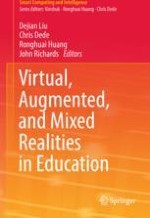2017 | OriginalPaper | Buchkapitel
10. Massively Multiplayer Online Roleplaying Games and Virtual Reality Combine for Learning
verfasst von : Eric Klopfer
Erschienen in: Virtual, Augmented, and Mixed Realities in Education
Verlag: Springer Singapore
Aktivieren Sie unsere intelligente Suche, um passende Fachinhalte oder Patente zu finden.
Wählen Sie Textabschnitte aus um mit Künstlicher Intelligenz passenden Patente zu finden. powered by
Markieren Sie Textabschnitte, um KI-gestützt weitere passende Inhalte zu finden. powered by
